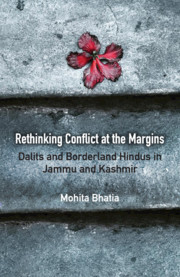Book contents
- Frontmatter
- Contents
- List of Figures and Tables
- Preface
- Acknowledgements
- 1 Introduction
- 2 Regional Diversities and the Conflict
- 3 Caste, Everyday Life and Conflict Politics
- 4 Border Realities: Contesting Hegemonic Paradigms of Nationalism and Conflict
- 5 Contesting the Homogenised Discourse of Religious Identities
- 6 Conclusion
- Glossary
- Bibliography
- Index
3 - Caste, Everyday Life and Conflict Politics
Published online by Cambridge University Press: 30 April 2020
- Frontmatter
- Contents
- List of Figures and Tables
- Preface
- Acknowledgements
- 1 Introduction
- 2 Regional Diversities and the Conflict
- 3 Caste, Everyday Life and Conflict Politics
- 4 Border Realities: Contesting Hegemonic Paradigms of Nationalism and Conflict
- 5 Contesting the Homogenised Discourse of Religious Identities
- 6 Conclusion
- Glossary
- Bibliography
- Index
Summary
Introduction
When I started conducting my ethnographic research in Kanhal village, I was enthused by the idea of recording Dalit voices. My enthusiasm rested on the presupposition that Dalit experiential reality would offer a subversive discourse to the mainstream political voices of Jammu, especially on the issue of the ‘Kashmir conflict’. Focussing specifically on the Scheduled Caste (SC) community, it took me some time to realise that while the views of this community as well as other lower castes offered an alternative vocabulary of conflict, their voices were not completely autonomous of the ‘normative’ or ‘conventional’ socio-political practices. Rather than a one-way process of providing an alternative perspective on conflict, these castes were deeply engaged with and influenced by the dominant conflict-based politics of Jammu. Their association with this politics led them to manifest a diversified and ambivalent response rather than simply prioritising their caste-based concerns.
As this chapter will go on to argue, SC engagement with this hegemonic politics – despite its exclusion of caste and class issues – helps one appreciate the problematic nature of the very category of ‘marginal’ often used to frame the SC position. The ‘marginal’ become less of something isolated from dominant socio-political structures and more of that which simultaneously associates with, appropriates, as well as subtly resists the very socio-political structures that define and reinforce its marginality. Rather than placing the marginalised in opposition to the dominant structures, one can use Bakhtin's dialogism to appreciate the complex interaction between them. As Bakhtin explains, ‘meaning-making’ always takes place in a dialogic manner, whereby the listener or addressee, despite her subordinate situation, is not passive. Even through conformation or agreement, she reformulates her response to add meaning to the dominant discourse. He states, ‘Agreement is very rich in varieties and shadings’ (Bakhtin 1986: 126). Hence, SCs’ association with the dominant socio-political discourse should not be reduced to simply imply submission but may be analysed to understand their varying priorities, concerns, as well as dilemmas. This chapter foregrounds the lived realities of this marginalised community that is marked not by radical forms of self-assertion but by many ambiguous and subtle forms of resistance. It provides an overview of caste dynamics in Jammu with reference to the positioning of SCs in the caste structure.
- Type
- Chapter
- Information
- Rethinking Conflict at the MarginsDalits and Borderland Hindus in Jammu and Kashmir, pp. 41 - 66Publisher: Cambridge University PressPrint publication year: 2020



